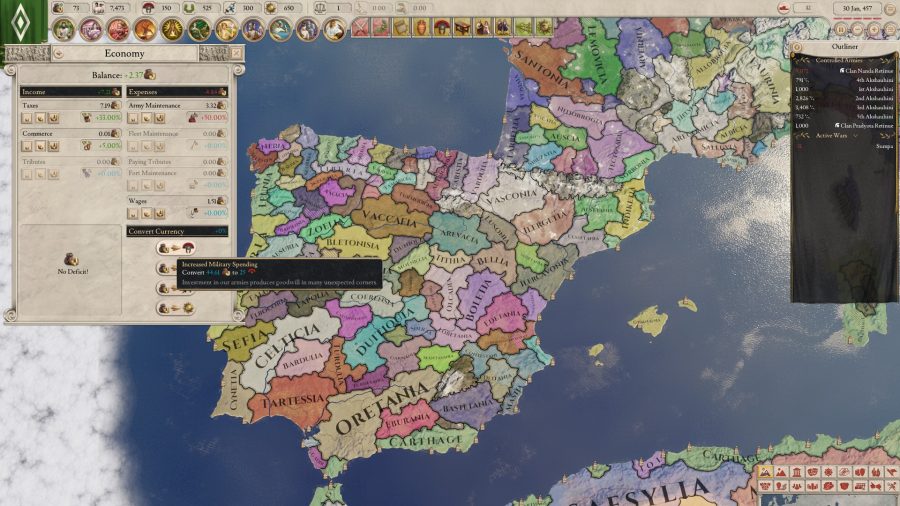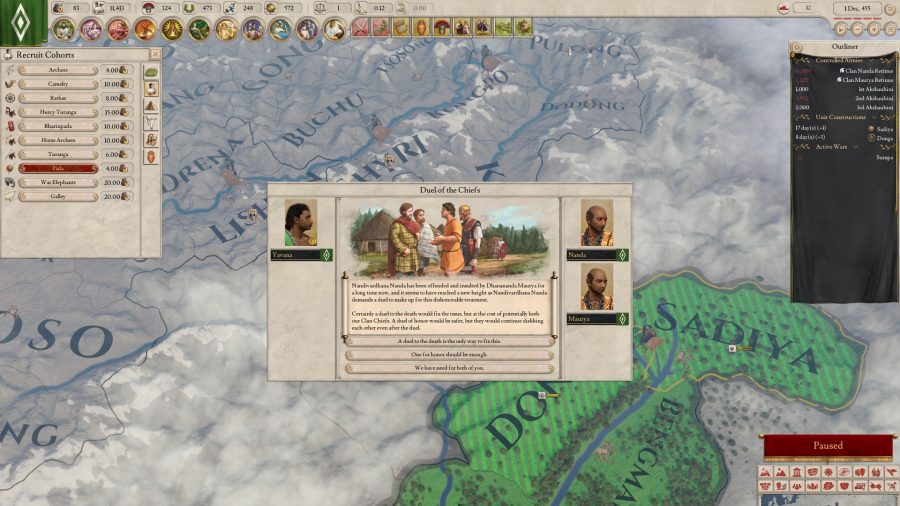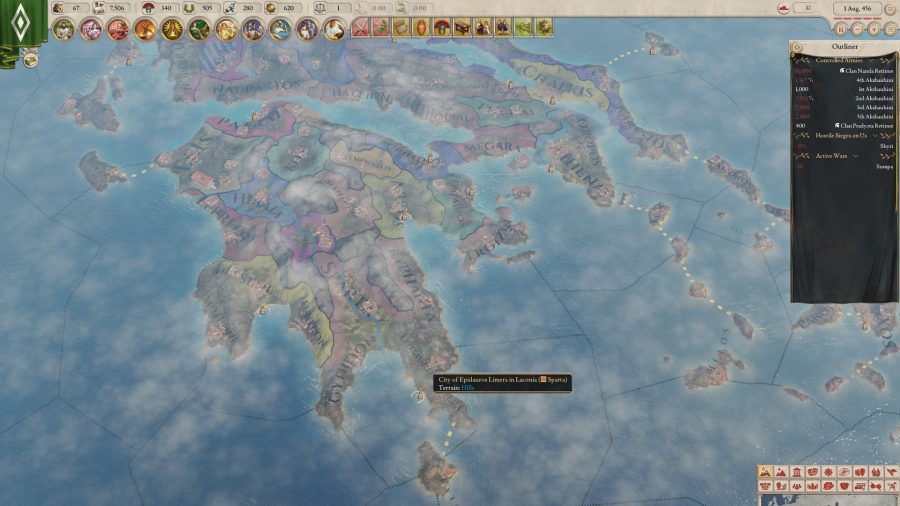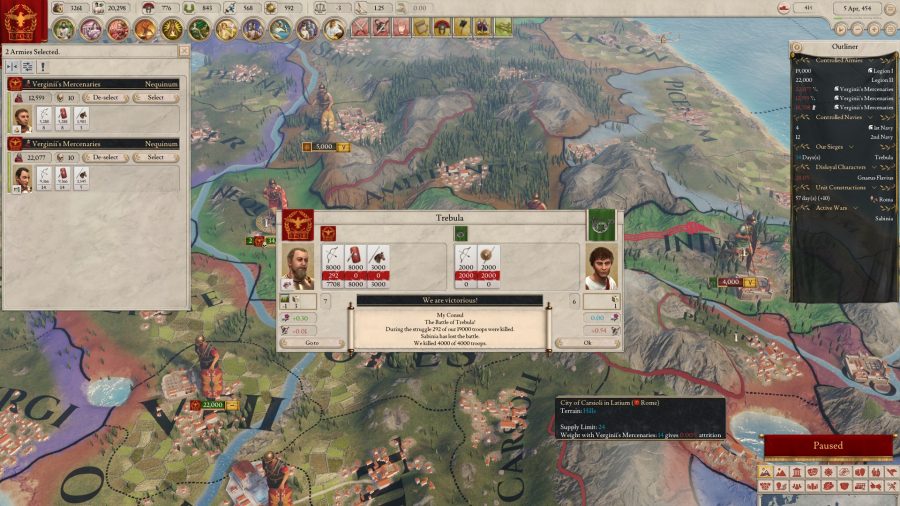Our Verdict
As Imperator grows in scale from its Clausewitz cousins, so too it grows in depth and ultimately in unwieldiness. But there's a grand strategy with aeons of play in it for you.
All eyes are on Rome in the early Classical era. The superpower has rivals to the east in Egypt, Phrygia, and Macedon, and internal squabbling to contend with among its own aristocracy. With the threat of civil war never far over the horizon, mighty Rome nevertheless expands at a rate that’s terrifying to its enemies, swallowing Etruria to the northwest and Sabinia to the east within years.
Meanwhile, thousands of miles away on the Indian subcontinent, a new ruler is appointed in Kamarupa. Bordering mighty Maurya, their potential for expansion is minimal. But what the highfalutin officials of Maurya don’t know is that Kamarupa couldn’t care less about aggressive expansion penalties.
From this starting point, or dozens of others according to your nation of choice, an entire alternative history plays out in Imperator: Rome. And it does so in such flabbergasting detail that you could give an hour-long TED talk on each play session – if only you could find an auditorium of people enraptured by the diplomatic ebb and flow of your imaginary empire.
Like its Clausewitz engine contemporaries Europa Universalis and Crusader Kings – and although I haven’t played Hearts of Iron, that too – Imperator: Rome is a historical strategy sandbox with vast scale and microscopic detail, It’s a game that fosters real fascination for the historical era it depicts, and despite those virtues, it’s a game that’s easy to get lost within and find yourself rudderless in a mess of menus and numbers.
Not that this is anything controversial or out of the ordinary to say about a Paradox grand strategy game. Diehard fans of any of the aforementioned series would tell you that you get out of these games what you put in; invest the time and you’re richly rewarded later on for pushing past your early befuddlement. And I’m inclined to agree with that. I can’t imagine what else might have prompted me to research the Kamarupans in my free time, after all.
Those on the flip side, however, the ones with 0.8 hours of Crusader Kings on their Steam accounts, would tell you that these Clausewitz Engine games buckle under the weight of their complexity and don’t do enough to let you in on their systems. I’m inclined to agree with that too. A tutorial does exist in Imperator: Rome, giving you the reins to Rome 450 years after its foundation and gently encouraging you towards a few empire management and expansion tasks. And in many ways it does convey the broad strokes of a proper campaign, but it also leaves out huge swathes of details and functions you’ll have to learn for yourself later on – or otherwise do some homework on YouTube.
So it was that my Kamarupan power was thrust into the campaign with no explicit objectives. And, indeed, I had no real grasp of how well I was managing my empire for hundreds of years. Simple tasks such as invading another empire’s land require a very specific diplomatic approach – usually fabricating a claim to their land, then using that as an excuse to declare war, then occupying their land, and finally negotiating peace but demanding that occupied land in return. Imperator: Rome’s tutorial encourages you to invade other territories, but it doesn’t get into the weeds as to how to achieve it. Without prior knowledge of Paradox grand strategy games you’ll struggle to navigate protocols like this.
There’s a huge amount of complexity to the numbers and systems that govern combat, and Imperator: Rome’s UI doesn’t do a stellar job of depicting it. It’s easy to miss the tactics selections of both your own army and that of your enemy, and the various buffs to certain units and attack types they create. It’s also difficult to get a read on how a battle’s actually going, dice roll by dice roll, because that data’s sandwiched away in an info-heavy battle screen.
You could level the same criticism at many other aspects of Imperator: Rome. Your various currencies – money, manpower, civic, religious, and oratory power – have a complex relationship with your actions and with each other. It’s even possible to convert these powers into gold if you’re cash-poor, a bit like those cities you designate to farm gold in Civ at the expense of growth and happiness. They’re the lifeblood of the game, but there’s no easy way to get a visual overview of those relationships. You have to delve into a lot of menus, keep tabs on all the bonuses and penalties you’ve acquired, and figure out why you have them, in order to really stay on top of your empire.
In many ways, that’s the game – it’s not supposed to be easy to preside over a Classical era superpower. But there’s a difference between mastering the inherent complexity of the task and wrestling the game into coughing up the info you need. This visual approach seems hard-baked into games running on this engine, but over in Stellaris there’s a more experimental and more easily understood method of giving you an overview of the many complicated systems interacting within your control.
But if you have sufficient interest in the Classical era, and/or are sufficiently taken by the gorgeous world map – full of long-forgotten borders that thousands of men died for and featuring names you’ve never heard before – you push on. And Imperator: Rome rewards you for doing so.
One of the best ways it does this is how it gives you random virtual dice rolls that form narratives about your subjects. I’ve had a consul who became depressed after freezing up at a public speech and losing reputation, who languished for years before eventually making a full recovery. I had another consul go stark raving mad, speaking in tongues and foaming at the mouth. Another one learned the secret of contentment, proclaiming to his court, “Simply stop wanting more.” The numerical impact of these micro-narratives wasn’t huge: my depressed consul dented my oratory power slightly, and my mad consul was a bit disloyal. Nothing to tear down a nation’s economy. But the stories stayed with me.
It rewards you in the slow-burning accomplishments you tick off over time, too. Gaining new territory is a long and arduous task that requires plenty of planning and close micromanagement while you do all the actual war-waging business, the movement of troops, and diplomacy. So when you zoom out on the map and just look at how big your humble empire’s grown, the reward feels deeper than it might in a 4X game, where battles handle themselves and diplomacy is a softer touch.
Inherently, it also rewards you with fluency in its systems. Since this is the sort of game played in tens of hours – perhaps hundreds – eventually your eye knows exactly where to look when you need to check what your relationship’s like with the Mercantile faction, or want to perform a ritual sacrifice to restore stability to your pops. So by virtue of it being a long-form experience, the reservations listed above do diminish over time.
Armchair general? Take charge in the best strategy games on PC
It’s like learning to drive, in that way. What a confounding and awkward thing a clutch pedal is when you first operate one. But how often do you even think about it after 100 hours behind the wheel? And without it, you wouldn’t have driven anywhere at all – unless you just bought an automatic. So it goes here: if you want to see the Classical era unfold in minute detail according to your actions on a beautiful world map, you need to spend a bit of time finding the biting point.
It’s just a shame that Imperator: Rome can’t find a way to be more accessible without losing its wonderful depth – not everyone has the time or the attention span to glean the enjoyment on offer here from that imposing front end.




